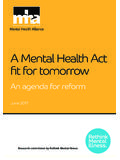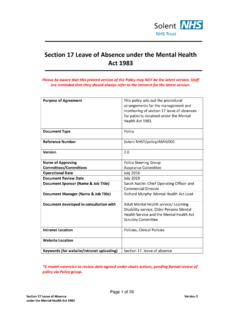Transcription of Children and Young People - Mental Health Alliance
1 Children and Young People Current law The Mental Health Act 1983 does not distinguish the situation of Children and Young People from that of adults, even though People of all age groups are subject to the Act. Most other relevant powers are contained in the Children Act 1989. These include powers to detain through secure accommodation as well as other relevant powers such as care orders. In some cases, secure accommodation under the Children Act would be an alternative for Young People who are in fact detained under the Mental Health Act 1983. There is also an overlap with criminal law. As an example of the complexity, a teenager who has been abused, and is in danger of abusing other Children in turn, may potentially be subject to all three regimes. Common law and case law elaborates on the relationship between parental and child consent, and in some cases the High Court may use its inherent jurisdiction when no other framework meets the need.
2 All this is framed within the Human Rights Act, particularly the rights on family and private life and liberty (Article 5 and 8 ECHR). In summary, law in this area is extremely complex and would benefit from simplification. There are four sets of problems with current law that are specific to Children : 1. Lack of expertise about Children s Mental Health needs Children express their Mental Health problems very differently from adults, because of their different social situation ( family and school) and developmental level. Yet the current law and the draft Mental Health Bill do not ensure that Children are dealt with by Children 's specialists, whether psychiatrists, advocates, or other professionals. 2. Lack of legal safeguards Children who need Mental Health treatment against their will do not have the appropriate level of protection which is essential for such vulnerable Children and which is already provided for in the Children Act 1989.
3 For example, the Children Act and associated case law provide a framework for resolving any tension between a parent's and a child's wishes. It provides a holistic view of the child including his or her family, social care and educational needs in addition to Mental Health needs. It also provides for a regular formal review of the needs of all looked-after Children . This is required by the UN Convention on the Rights of the Child, a requirement that applies equally to a child looked after by Health authorities. None of this is provided for in either the current Mental Health Act or the draft Bill. 3. Lack of safeguards for Children whose parents consent on their behalf Patients under 18 who are treated under the authority of those who have parental responsibility need extra protection for similar reasons to adult patients who are not considered capable of consenting. 4. Lack of provision for Children whose parents are mentally ill There is no provision for the Children of patients subject to compulsory powers in the Mental Health Act, nor in the draft Bill.
4 Children in these families are likely to have significant unmet needs. Draft Mental Health Bill 2004 This draft Bill does make improvements in respect of Young People over the 2002 draft. Firstly, Young People aged 16 and 17 will be able to agree to or refuse treatment for Mental disorder and their decision will not be able to be overridden by parental consent (as is the case under the 1983 Act). Secondly, it provides safeguards for Children who neither consent nor are sectioned, that is, who are treated under parental consent either because of the child s immaturity or illness. These include: a written care plan approved by an independent medical expert; a regular review every 3 months; representation by a nominated person; the right to go to the tribunal to resolve disputes about the care plan and to review the lawfulness of detention; and access to advocacy. Nevertheless, there are a number of problems specific to Children which remain and problems in other provisions, such as the criteria for compulsion, which apply equally to Children .
5 Alliance position Legislative framework 1. Amending the Children Act We believe that serious consideration should be given to the possibility of including the powers for compulsory treatment of mentally disordered Children in an amendment to the Children Act 1989 instead of the Mental Health Bill. In this case, Children would of course have to be specifically excluded from the Mental Health Bill, and in any case it might be appropriate to simplify the law by excluding the (rarely if ever used) possibility of Mental Health services using secure accommodation powers rather than Mental Health powers - see Bailey et al, 2002. In this way, the Children Act could provide a much more appropriate framework, containing, for example, the welfare checklist and the concept of 'the ascertainable wishes and feelings of the child concerned (considered in the light of his age and understanding)'. Whichever legislation is used for the compulsory treatment of Children , it would still be important for the Mental Health Bill to include a duty on the clinical supervisor of a compelled parent to consider family needs (as discussed below).
6 2. Balance parents rights with Children 's rights using the Children Act The Children Act 1989 and associated case law, in the context of the Human Rights Act 1998, provide a framework for resolving the tension between parental rights and Children 's rights in the case of a disagreement. The Alliance believes that this framework should be the one used in the case of Mental Health law. This could be done through amendments to the Children Act 1989 or through a principle incorporated into the Mental Health Bill, based on the Children Act section 1(3)(a) and the White Paper1, which would state that in all decisions relating to a child, decision-makers 'shall have regard to the ascertainable wishes and feelings of the child concerned (considered in the light of his age and understanding)'. This proposal would enable the court to allow a child who is Frazer competent' to make his or her own decisions to the same extent as if he or she were an There should be a presumption that a child is Frazer competent from the age of 10 or 12.
7 We welcome the provisions in the 2004 Bill to treat 16 and 17 year olds as competent adults; however, we believe the special safeguards should apply to this group. We wonder whether this might solve the difficulty as to how to enable 16 and 17 year olds to be treated like adults. It need not prevent other Children Act type provisions applying for this age group. In this context it would be useful for the tribunal to have a duty to consider the rest of the welfare checklist from the Children Act 1989 1(3), which also includes, for example, the child s educational needs and parents' capacity to parent. The welfare principle itself should be included and the Bill should make clear that when either, informal or compulsory care and treatment of a child is considered, the child's welfare shall be the paramount consideration. Safeguards for Children and Young People and patients with parental responsibility There is a need for specialist child and adolescent care and treatment We believe it is essential that a child receiving Mental Health services should receive them from a person qualified specifically in child and adolescent Mental Health (CAMH).
8 This is even more essential wherever a child is sufficiently ill to be treated under formal compulsory powers, whether or not formal powers are actually used. The Royal College of Psychiatry 's NICAPS study estimated that nearly 600 People under 18 are 'inappropriately' (in the opinion of the lead clinician) admitted to adult psychiatric wards each year, and over 100 are 'inappropriately' admitted to paediatric in-patient units with Mental Health problems each In the case of adult psychiatric units where the child is under compulsion, this is in violation of the UN Convention on the Rights of the Child, Article 37(c). We believe it should be a legal requirement that a child's clinical supervisor under the Bill must be a specialist in CAMH, except in an emergency if no CAMH specialist is available. An equivalent provision has been made under the Scottish Mental Health Act. If necessary due to a shortage of such specialists and services, this provision might not be brought into force until there are enough specialists and services are available.
9 1 Reforming the Mental Health Act ,1983. Part I, Dec 2000, p15, para 2 The House of Lords decided that a child was capable of giving consent if he was capable of understanding what was proposed and of expressing his own wishes (All England Law Report, 1983, vol3, p402). 3 National In-Patient Child and Adolescent Psychiatry Study (NICAPS), Royal College of Psychiatry, 2001. Part Duty psychiatrists should also receive a level of CAMH training to cover emergencies involving patients who are Young People . We believe that there should be a statutory requirement to conduct a multi-disciplinary assessment before Children are made subject to compulsory powers. The advocate should also, by law, be a specialist in advocating for Children and the approved Mental Health professional should be someone whose background is child and family social work, with appropriate extra training for fulfilling this role.
10 Finally, the expert panel members advising the tribunal, and professionals sitting on the tribunal, should be a CAMH professional and/or a child and family social worker specialising in Mental Health , and a family law specialist. There should be a comprehensive care plan which focuses on the needs of the child We are concerned that the individual written care plan take account of the full needs of the child including those outside Mental Health . This should be the case both for Children who are formally compelled and for qualifying Children . We propose that the clinical supervisor should draw up the care plan together with a child and family social worker. In practice there should be, and in most cases there is, a child and family social worker in the CAMH clinical team. We propose that in preparing the care plan there should be a duty to consult: the child, his nominated person and his advocate; a person with parental responsibility; the child 's school; and other relevant services involved in the child s care and welfare ( social worker, youth offending team, voluntary organisation etc as appropriate).






